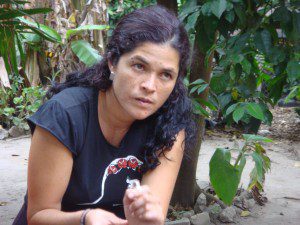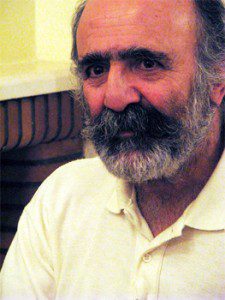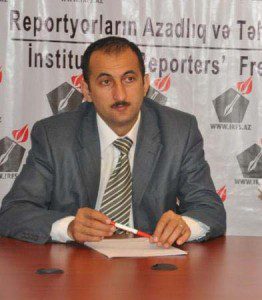28 Feb 2012 | Awards, Azerbaijan News
Recognising investigative journalism of dogged determination across a range of media including print, online, radio and television, taking into consideration impact, originality and revelation
Han Han, blogger, China
 The author of China’s most widely read blog, 29-year-old Han Han has been called “the world’s most popular blogger”. He is also famed for being a cultural critic, race-car driver, actor and novelist. But despite his rock star status he has long been considered a thorn in the side of the Chinese government.
The author of China’s most widely read blog, 29-year-old Han Han has been called “the world’s most popular blogger”. He is also famed for being a cultural critic, race-car driver, actor and novelist. But despite his rock star status he has long been considered a thorn in the side of the Chinese government.
Though he has avoided ideological allegiances, Han Han recently sparked controversy with his essays, “On Democracy”, “On Revolution” and “Wanting Freedom”, which questioned where democracy really equals freedom and whether China will ever be capable of genuine reform.
Han Han has talked about suffering censorship: “Each time I do finish writing something and then can’t see it [after I post it, because it has been censored], I get despondent. And there are just so many government departments [to get past]. Even if the propaganda department and the General Administration of Press and Publications are fine with something, any department issued can wipe your essay away with a simple phone call.”
Lucía Escobar, journalist, Guatemala
 Lucía Escobar’s story highlights the state of press freedom in Guatemala, where journalists are regularly intimidated by paramilitary groups. Escobar is a freelance columnist for El Periódico, a publication based in Guatemala City, and also operates an online radio station, Radio Ati.
Lucía Escobar’s story highlights the state of press freedom in Guatemala, where journalists are regularly intimidated by paramilitary groups. Escobar is a freelance columnist for El Periódico, a publication based in Guatemala City, and also operates an online radio station, Radio Ati.
On 19 October 2011, Escobar published a column alleging that a local mayor had turned a citizens’ group into a death squad that was socially cleansing “undesirables”, such as beggars and homeless people, and committed crimes including lynchings, torture, beatings and a kidnapping. In her column, Escobar blamed local government figures for being indifferent to the group’s activities.
Subsequent death threats forced Escobar to flee her home with her family and she has said she will remain in exile until the situation improves. No action has been taken by Guatemalan authorities, pointing to a worrying trend in Central America where those in power ignore attacks on journalists.
Kayvan Samimi, journalist, Iran
 Iranian journalist Kayvan Samimi has been instrumental in keeping dissent alive in the Islamic Republic.
Iranian journalist Kayvan Samimi has been instrumental in keeping dissent alive in the Islamic Republic.
Despite being imprisoned since 2009, Samimi has played a significant role in highlighting the attacks against those who attempt criticise the Iranian administration. In May 2011 Samimi co-authored a letter condemning the Iranian administration for its treatment of prisoners. The letter recorded the methods of torture used against the signatories.
He is serving a six-year prison sentence on charges of “propagating against the regime” and “assembly and collusion to disrupt national security” and has been banned from “political, social, and cultural activities” for 15 years, having been detained in the immediate aftermath of the 2009 presidential election.
Idrak Abbasov, journalist, Azerbaijan
 Idrak Abbasov is an Azerbaijani journalist whose investigative work has put his life in danger. Abbasov reports for newspaper Ayna-Zerkalo, contributes to the Institute for War & Peace Reporting website, and he is one of the founding members of Azerbaijan’s Institute for Reporters’ Freedom and Safety (IRFS) .
Idrak Abbasov is an Azerbaijani journalist whose investigative work has put his life in danger. Abbasov reports for newspaper Ayna-Zerkalo, contributes to the Institute for War & Peace Reporting website, and he is one of the founding members of Azerbaijan’s Institute for Reporters’ Freedom and Safety (IRFS) .
On 9 September 2011, after Abbasov investigated the activities of a local oil company, the State Oil Company of Azerbaijan (SOCAR) sent bulldozers to his family’s home. SOCAR claimed ownership of the site as part of a project to develop local oil resources with Global Energy Azerbaijan Ltd. His parents and brother were hospitalised after being attacked by the company’s security service during the incident.
It is believed that bulldozers targeted the journalist’s home because of his work monitoring human rights. The violence, threats and harassment of Abbasov and his family continued when his parents were again attacked at their home. One assailant reportedly said: “Tell Idrak to get smarter, or we will cut off his ears.”

supported by

18 Jan 2012 | News and features
 As Wikipedia and other websites begin blackout to protest against US anti-piracy laws, Index and the international human rights community speak out on PROTECT IP Act
As Wikipedia and other websites begin blackout to protest against US anti-piracy laws, Index and the international human rights community speak out on PROTECT IP Act
Sen. Harry Reid
Majority Leader
United States Senate
522 Hart Senate Office Bldg
Washington, DC 20510
Dear Majority Leader Harry Reid,
As human rights and press freedom advocates, we write to express our deep concern about S. 968, the PROTECT IP Act (PIPA), and the threat it poses to international human rights. Like H.R. 3261, the Stop Online Piracy Act (SOPA), PIPA requires the use of internet censorship tools, undermines the global nature of the internet, and threatens free speech online. PIPA introduces a deeply concerning degree of legal uncertainty into the internet economy, particularly for users and businesses internationally. The United States has long been a global leader in support of freedom of speech online, and we urge the Senate not to tarnish that reputation by passing PIPA.
Today, some of the world’s most repressive countries, like China, Iran, Yemen, Saudi Arabia, and Syria use DNS filtering as a means to silence their citizens. As over 80 human rights organizations recently wrote in a letter opposing SOPA, “institutionalizing the use of internet censorship tools to enforce domestic law in the United States… creates a paradox that undermines its moral authority to criticize repressive regimes.”[1] In fact, PIPA would send an unequivocal message to other nations that the use of these tools is not only acceptable, but encouraged.
DNS filtering is a blunt form of censorship that is ineffective at achieving its stated goal, while causing collateral damage to online communities on a massive scale. But while DNS filtering is trivial for users to circumvent, this technology would fundamentally undermine the integrity of the global internet, making users more vulnerable to cybersecurity attacks and identity fraud. Additionally, any legislation that mandates filtering of websites is prone to unintended consequences, such as overblocking. For example, in early 2011, when the Immigration and Customs Enforcement agency seized the domain mooo.com, it accidentally removed the web addresses of 84,000 (almost exclusively legal) connected domain names.[2] Moreover, once the technical infrastructure enabling censorship is in place, it allows future governments (and private actors) to block virtually any type of content on the web, making the provisions of this bill prone to mission creep.
The attempts at due process provisions in this bill do not respect the global nature of the internet. The network effects of the internet are realized when users and innovators are able to connect around the globe. However, creating a mechanism that requires a representative of a website to make a court appearance in the U.S. in order to defend themselves against an allegation of infringement would disproportionately impact smaller online communities and start-ups based abroad that do not have the capacity to address concerns in the United States. These websites would risk losing access to advertising services, payment providers, search engine listings, and their domain name. Together, these pieces of the bill would drive international innovators away from depending on U.S. services as a hedge against legal threats, while missing what should be the target of this legislation: preventing large-scale commercial infringement.
PIPA further creates a double jurisdiction problem, whereby non-U.S.-based sites must determine whether a site is legal in both the country it is operating in and the United States. This raises serious concerns about the scope of the bill, as foreign websites falling under PIPA’s definition of infringement may be perfectly legal in other jurisdictions. For example, the domain of a Spanish site, rojadirecta.org, was seized in early 2011 by U.S. authorities without adequate due process, notification to the site’s owners, or an option to defend themselves, despite having been declared legal by two Spanish courts.[3]
The definition of “information location service” is overly broad and would have a chilling effect on online speech. PIPA would make nearly every U.S.-based actor on the internet, including not only blogs, chat rooms, and social networks but users as well, potentially subject to enforcement orders of the bill. Additionally, the requirement that these service providers act “as expeditiously as possible to remove or disable access” to an allegedly infringing website imposes an unprecedented burden on any service that contains links, incentivizing the screening and removal of content in order to avoid being caught up in legal proceedings. Further, even if an accused website is later found to be innocent, links to that website could have effectively disappeared from the web, having been permanently removed when the court notice was served.
PIPA is also vague with respect to how links would be defined, including if all links associated with a domain or subdomain would be required to be blocked and if this would apply to future attempts by users to post content. This provision could potentially be interpreted in a way that would force services that allow users to post links to proactively monitor and censor the activities of their users, dramatically altering the role of these platforms in promoting free speech and setting a dangerous precedent for other countries.
We understand the pressure that lawmakers face in passing copyright enforcement legislation, and agree that protecting the rights of creators is an important goal. However, enforcement should not come at the expense of free speech or due process. This bill is fundamentally flawed due to its wide range of restrictive and potentially repressive measures. Even if individual elements of the proposal, such as DNS filtering are modified, postponed or amended, the legislation as a whole represents a precedent that is a real danger for human rights on the internet. We must remain conscious of the fact that the internet is a key enabler of human rights and innovation, and decisions over its governance should not be made hastily and without full consideration of collateral consequences.
We strongly urge the Senate to stand for human rights, defend the open internet, and reject the PROTECT IP Act.
Sincerely,
Access
AGEIA DENSI
Amnesty International
Asociatia pentru Technologie si Internet (ApTI)
Association for Progressive Communications (APC)
Article 19
Bits of Freedom
Bytes for All Pakistan
Centre for Internet and Society – India
Communication is Your Right!
Computer Professionals for Social Responsibility
Creative Commons Guatemala
ONG Derechos Digitales – Chile
Demand Progress
Digitale Gesellschaft e.V.
Eduardo Bertoni on behalf of iLEI/CELE UP (Iniciativa Libertad de Expresión en Internet, Centro de Estudios en Libertad de Expresión, Universidad de Palermo, Argentina)
Electronic Frontier Finland (EFFi)
EsLaRed
European Digital Rights (EDRi) (an association of 27 privacy and civil rights groups in Europe)
FGV/CTS
FoeBuD
Foundation for a Free Information Infrastructure (FFII)
Free Network Foundation
Free Press Unlimited
Free Software Foundation Europe (FSFE)
Fundación Karisma
FUNREDES
German Working Group against Internet Blocking and Censorship (Arbeitskreis gegen Internet-Sperren und Zensur, AK Zensur)
Hiram Meléndez-Juarbe on behalf of the New Technologies, Intellectual Property and Society Clinic University of Puerto Rico Law School
Human Rights Watch
Index on Censorship
Instituto Nupef
Internet Democracy Project – India
Iuridicum Remedium o.s.
Julia Group
Guardian Project
La Quadrature du Net
MayFirst/People Link
Net Users Rights Protection Association (NURPA)
Open Rights Group (ORG)
Open Source Initiative
Palante Technology Cooperative
Panoptykon Foundation
People Who
Public Sphere Project
Quintessenz
Reporters Without Borders
Vrijschrift
WITNESS
wlan slovenia, open wireless network
18 Jul 2011 | Americas, Mexico
The recent murder of Argentine singer Facundo Cabral in Guatemala is an incredible tragedy. Cabral, a pacifist and one of Latin America’s most celebrated protest singers, left his country in 1973 for almost a decade after a military junta took over and during a campaign of state-sponsored violence carried out major human rights violations. He died in a country that is known for violence, first during a civil war, and now under the overwhelming control of organised crime. Cabral was collateral damage.
It has long been suspected that Guatemala’s entertainment networks are controlled by thugs who combine the promotion of artists with other illegal activities. According to media reports, the guns that killed Cabral were directed at his promoter, Henry Fariñas, a Nicaraguan businessman who owns bars and cabarets across Central America. Reports suggests the shooting was drug-related. That the shooting was so brazen — it took place in broad daylight, on the route to the airport and the singers vehicle was hit by a hail of bullets from three carloads of men — is just one example of how far rule of law has Guatemala.
Many Central American nations, notably Mexico, are also experiencing similar outrageous acts of violence perpetrated by violent criminal organisations which demonstrate how far organised crime has penetrated society.
The murder of Cabral is a blow to free speech; he was a man who fought for freedom of expression during South America’s dark days of state violence, and died in a new era of gang violence.
3 Jun 2011 | Index Index, minipost, News and features
The United Nations special rapporteur for free expression Frank La Rue has called for the abolition of criminal defamation laws. Guatemalan lawyer La Rue also condemned the use of “national security” reasons to curb free expression:
In a report released today, LaRue comments:
The Special Rapporteur reiterates the call to all States to decriminalize defamation. Additionally, he underscores that protection of national security or countering terrorism cannot be used to justify restricting the right to expression unless it can be demonstrated that: (a) the expression is intended to incite imminent violence; (b) it is likely to incite such violence; and (c) there is a direct and immediate connection between the expression and the likelihood or occurrence of such violence.
Criminal defamation cases are frequently brought to silence criticism of authorities. Recent examples include actions brought against journalist Art Troitsky in Russia and anti death penalty campaigner Alan Shadrake in Singapore.
 The author of China’s most widely read blog, 29-year-old Han Han has been called “the world’s most popular blogger”. He is also famed for being a cultural critic, race-car driver, actor and novelist. But despite his rock star status he has long been considered a thorn in the side of the Chinese government.
The author of China’s most widely read blog, 29-year-old Han Han has been called “the world’s most popular blogger”. He is also famed for being a cultural critic, race-car driver, actor and novelist. But despite his rock star status he has long been considered a thorn in the side of the Chinese government. Lucía Escobar’s story highlights the state of press freedom in Guatemala, where journalists are regularly intimidated by paramilitary groups. Escobar is a freelance columnist for El Periódico, a publication based in Guatemala City, and also operates an online radio station, Radio Ati.
Lucía Escobar’s story highlights the state of press freedom in Guatemala, where journalists are regularly intimidated by paramilitary groups. Escobar is a freelance columnist for El Periódico, a publication based in Guatemala City, and also operates an online radio station, Radio Ati. Iranian journalist Kayvan Samimi has been instrumental in keeping dissent alive in the Islamic Republic.
Iranian journalist Kayvan Samimi has been instrumental in keeping dissent alive in the Islamic Republic. Idrak Abbasov is an Azerbaijani journalist whose investigative work has put his life in danger. Abbasov reports for newspaper Ayna-Zerkalo, contributes to the Institute for War & Peace Reporting website, and he is one of the founding members of Azerbaijan’s Institute for Reporters’ Freedom and Safety (IRFS) .
Idrak Abbasov is an Azerbaijani journalist whose investigative work has put his life in danger. Abbasov reports for newspaper Ayna-Zerkalo, contributes to the Institute for War & Peace Reporting website, and he is one of the founding members of Azerbaijan’s Institute for Reporters’ Freedom and Safety (IRFS) .


